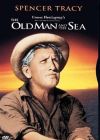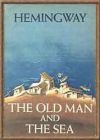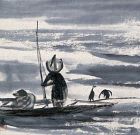老人与海 The Old Man and the Sea
《老人与海》,美国作家海明威(Ernest Hemingway)著。《老人与海》是海明威的代表作,也是一部象征性的小说。主人公圣地亚哥是一位老渔夫,他经过重重艰险,捕获了“一条不止一千五百磅重的大马林鱼”,但这条大马林鱼却被鲨鱼吃光了,圣地亚哥只拖回了一副鱼的骨架。
海明威(1899--1961年),美国小说家,1954年诺贝尔文学奖获得者,获奖之作就是《老人与海》。这部小说是根据一位古巴渔夫的真实经历创作的,以摄像机般的写实手法记录了圣地亚哥老人捕鱼的全过程,塑造了一个在重压下仍然保持优雅风度、在精神上永远不可战胜的老人形象。这部小说创下了人类出版史上空前绝后的一个纪录:48小时售出530万册! 当他被宣布为当年的普利策文学奖得主时,评论界一致称好。"人可以被毁灭,却不可以被打败。"海明威在《老人与海》里所说的话,不仅打动了读者,也征服了评论者。 1954年,因为海明威"精通于叙事艺术,突出地表现在他的近著《老人与海》之中;同时也因为他在当代风格中所发挥的影响",海明威又获诺贝尔文学奖。"每一句话和每一段落,都要尽量写得简洁。"这是海明威写作的信条之一,这使得他的作品改编成电影的数量比任何其他一位获奖者都多.
小说以写实手法展现了捕鱼老人圣地亚哥在重压下仍保持的优雅风度,这种精神上永远不可战胜者成为文学史上最著名的"硬汉"形象之一。对于《老人与海》这本被译成几十种文字的作品, 海明威自己认为 "是这一辈子所能写的最好的一部作品"。
圣地亚哥是古巴的一个老渔夫,他年轻时非常出色,强健有力,他曾经和一个黑人比赛掰腕子,比了一天一夜,最后终于战胜了对手。到了晚年,他的精力和反应都不如从前,老婆死后,他一个人孤独地住在海边简陋的小茅棚里。有一段时间,老渔夫独自乘小船打鱼,他接连打了84天,但一条鱼也没有捕到。本来一个叫曼诺林的男孩子总是跟他在一起,可是日子一久曼诺林的父母认为老头悖运,吩咐孩子搭另一条船出海,果然第一个星期就捕到三条好鱼。孩子每次见到老头每天空船而归,心里非常难受,总要帮他拿拿东西。
圣地亚哥瘦削憔悴,后颈满是皱纹,脸上长着疙瘩,但他的双眼像海水一样湛蓝,毫无沮丧之色。他和孩子是忘年交。老头教会孩子捕鱼,因为孩子很爱他。村里很多打鱼的人都因为老头捉不到鱼拿他开玩笑,但是在曼诺林的眼里,老头是最好的渔夫。他们打渔不但是为了挣钱,更是把它看作共同爱好的事业。孩子为老头准备饭菜,跟他一起评论棒球赛。老头特别崇拜棒球好手狄马吉奥。他是渔民的儿子,脚跟上虽长有骨剌,但打起球来生龙活虎。老头认为自己已经年迈,体力不比壮年,但他懂得许多捕鱼的诀窍,而且决心很大,因此他仍是个好渔夫。
老人和孩子相约第二天,也就是第85天一早一起出海。半夜醒后他踏着月光去叫醒孩子,两人分乘两条船,出港后各自驶向自己选择的海面。天还没有亮,老头已经放下鱼饵。鱼饵的肚子里包着鱼钩的把子,鱼钩的突出部分都裹着新鲜的沙丁鱼。 鱼饵香气四溢,味道鲜美。正当圣地亚哥目不转睛地望着钓丝的时候,他看见露出水面的一根绿色竿子急遽地附入水中。他用右手的大拇指和食指轻轻捏着钓丝。接着钓丝又动了一下,拉力不猛。老头明白,一百英寸之下的海水深处,一条马林鱼正在吃钓丝上的沙丁鱼。他感觉到下面轻轻的扯动,非常高兴。过了一会儿他觉得是一个硬梆梆、沉甸甸的东西,他断定这是一条大鱼。这激起他要向它挑战的决心。
老人先松开钓丝,然后大喝一声,用尽全身的力气收拢钓丝,但鱼并不肯轻易屈服,非但没有上来一英寸,反而慢慢游开去。老头把钓丝背在脊梁上增加对抗马林鱼的拉力,可是作用不大,他眼睁睁地看着小船向西北方飘去。老头想鱼这样用力过猛很快就会死的,但四个小时后,鱼依然拖着小船向浩渺无边的海面游去,老头也照旧毫不松劲地拉住背在脊梁上的钓丝。他们对抗着。这时,老人回头望去,陆地已从他的视线中消失。太阳西坠,繁星满天。老人根据对星星的观察作出判断:那条大鱼整夜都没有改变方向,夜里天气冷了,老头的汗水干了,他觉得浑身上冷冰冰的。他把一个麻袋垫在肩膀上的钓丝下面减少摩擦,再弯腰靠在船头上,他就感到舒服多了。为了能坚持下去,他不断的和鱼、鸟、大海对话,不断的回忆往事,并想到了曼诺林,他大声地自言自语:“要是孩子在这儿多好啊,好让他帮帮我,再瞧瞧这一切。”
破晓前天很冷,老头抵着木头取暖。他想鱼能支持多久我也能支持多久。他用温柔的语调大声说:“鱼啊,只要我不死就要同你周旋到底。”太阳升起后,老头发觉鱼还没有疲倦,只是钓丝的斜度显示鱼可能要跳起来,这正是他求之不得的事。他说:“鱼啊,我爱你,而且十分尊敬你。可是今天天黑以前我一定要把你弄死。”鱼开始不安分了,它突然把小船扯得晃荡了一下。老头用右手去摸钓丝,发现那只手正在流血。过了一会他的左手又抽起筋来,但他仍竭力坚持。他吃了几片金枪鱼肉好增加点力气来对付那条大鱼。正在这时钓丝慢慢升起来,大鱼终于露出水里。在阳光下,这浑身明亮夺目,色彩斑斓。它足有18英尺长,比他的船还要大。它的喙长得象一根垒球棒,尖得象一把细长的利剑。它那大镰刀似的尾巴入水中后,钓丝也飞快地滑下去。
老人和大鱼一直相持到日落,双方已搏斗了两天一夜,老头不禁回想起年轻时在卡萨兰卡跟一个黑人比赛扳手的经历。他俩把胳膊肘放在桌上划粉笔线的地方,前臂直,两手握紧,就这样相持了一天一夜。八小时后每隔四个钟头就换一个裁判,让他们轮流睡觉。他和黑人的手指甲里都流出血来。赌注给黑人的渔民喝了朗姆酒使出全身力气,竟把他的手压下去将近三英寸,但桑提亚哥又把手扳回原来的位置,并且在第二天天亮时奋力把黑人的手扳倒,从此他成了人们心目中的“冠军”。
老人和大鱼的持久战又从黑夜延续到天明。大鱼跃起十二次后开始绕着小船打转。老人头昏眼花,只见眼前黑点在晃动,但他仍紧紧拉着钓丝。当鱼游到他身边时,他放下钓丝踩在脚下,然后把鱼叉高高举起扎进鱼身。大鱼跳到半空,充分展示了它的美和力量,然后轰隆一声落到水里,浪花溅满老头一身,也溅湿了整条小船。鱼仰身朝天,银白色的肚皮翻上来,从它身体流出来的血染红了蓝色的海水。老头把大鱼绑在船边胜利返航。可是一个多小时后鲨鱼嗅到了大鱼的血腥味跟踪而至抢吃鱼肉。老头见到第一条游来的鲨鱼的蓝色的脊背。他把鱼叉准备好,干掉了第一只鲨鱼。几小时后又两条鲨鱼逼近船尾去咬大鱼的尾巴,老头用刀系在船桨上杀死了两条来犯的鲨鱼,但在随后的搏斗中刀也折断了,他又改用短棍。然而半夜里鲨鱼成群结队涌来时,他已无力对付他们了,但他坚持搏斗,甚至把船舵都打断了,最后鲨鱼还是吃光了老人两天的辛劳,只剩下鱼头和鱼尾……
船驶进小港老人回到窝棚,天亮后人们看见船旁硕大无比的白色鱼脊骨,大家都惊叹老人圣地亚哥。第二天早上,孩子来看望老头,见到他疲倦得熟睡不醒时,不禁放声大哭。老头醒来后,孩子给他端一杯热气腾腾的咖啡。两人相约过几天一起去打鱼,孩子说他还有很多东西要学。孩子离去后,老头睡着了,他又梦见非洲的狮子……
这本书讲了古巴的一个名叫圣地亚哥的老渔夫,独自一个人出海打鱼,在一无所获的84天之后钓到了一条无比巨大的马林鱼。这是老人从来没见过也没听说过的比他的船还长两英尺的一条大鱼。鱼的劲非常大,拖着小船漂流了整整两天两夜,老人在这两天两夜中经历了从未经受的艰难考验,终于把大鱼刺死,拴在船头。然而这时却遇上了鲨鱼,老人与鲨鱼进行了殊死搏斗,结果大马林鱼被鲨鱼吃光了,老人最后拖回家的只剩下一副光秃秃的鱼骨架和一身的伤。
1. He no longer dreamed of storms, nor of women, nor of great occurrences, nor of great fish, nor fights, nor contests of strength, nor of his wife. He only dreamed of places now and of the lions on the beach. They played like young cats in the dusk and he loved them as he loved the boy.
Since the publication of The Old Man and the Sea, there has been much debate surrounding the story's symbols. Does the old man represent the author nearing the end of his career? Do the vicious sharks stand for cruel literary critics or the inevitably destructive forces of nature? While most readers agree that, as a parable, The Old Man and the Sea addresses universal life, the image of the lions playing on the African beach, which is presented three times in the novel, remains something of an enigma. Like poetry, the lions are supremely suggestive without being tethered to a single meaning. Indeed, the only thing that is certain about the image is that it serves as a source of comfort and renewal for Santiago.
This passage, which describes Santiago's dreams on the night before he sets out for his fishing expedition (the first day that the narrative covers), simultaneously confirms and moves beyond Hemingway's immediately recognizable vision of the universe. Hemingway made his career telling stories about “great occurrences,” “great fish,” and “contests of strength.” The fact that Santiago no longer dreams of any of these makes him unique among Hemingway's heroes. Of course, by dreaming of lions he is still in a recognizably “Hemingwayesque” world, but the lions here are at play and thus suggest a time of youth and ease. They are also linked explicitly to Manolin, a connection that is made apparent at the end of the novel as the boy watches over his aged friend as Santiago's dream of the lions returns.
2. “I have never seen or heard of such a fish. But I must kill him. I am glad we do not have to try to kill the stars.” Imagine if each day a man must try to kill the moon, he thought. The moon runs away. . . . Then he was sorry for the great fish that had nothing to eat and his determination to kill him never relaxed in his sorrow for him. . . . There is no one worthy of eating him from the manner of his behavior and his great dignity. I do not understand these things, he thought. But it is good that we do not have to try to kill the sun or the moon or the stars. It is enough to live on the sea and kill our true brothers.
This passage is found at the end of the third day related by the novella. As Santiago struggles with the marlin, he reflects upon the nature of the universe and his place in it. He displays both pity for the fish and an unflagging determination to kill it, because the marlin's death helps to reinvigorate the fisherman's life. The predatory nature of this exchange is inevitable, for just as hawks will continue to hunt warblers, men will continue to kill marlin, and sharks will continue to rob them of their catches. The cruelty of this natural order is subverted, however, because of the kinship Santiago feels for his prey. His opponent is worthy, so worthy, in fact, that he later goes on to say that it doesn't matter who kills whom. There is, in the old man's estimation, some sense to this order. Man can achieve greatness only when placed in a well-matched contest against his earthly brothers. To find glory, Santiago does not need to extend himself beyond his animal nature by looking to the sun or the stars.
3.You did not kill the fish only to keep alive and to sell for food, he thought. You killed him for pride and because you are a fisherman. You loved him when he was alive and you loved him after. If you love him, it is not a sin to kill him. Or is it more?
As Santiago sails back to his village on the fourth day of the novella, towing behind him the carcass of the decimated marlin, he tries to make sense of the destruction he has witnessed. He feels deeply apologetic toward the fish, which he sees as too dignified for such a wasteful end. He attempts to explain to himself his reasons for killing the fish, and admits that his desire to hunt the fish stemmed from the very same quality that led to its eventual destruction: his pride. He then justifies his behavior by claiming that his slaying of the marlin was necessitated by his love and respect for it. Indeed, when Santiago kills the fish, the loss of life is somehow transcendently beautiful, as opposed to the bold, senseless scavenging on the part of the sharks.
下载链接:Ernest Hemingway-The Old Man and the Sea.pdf
1,百度百科 http://baike.baidu.com/view/37668.htm
2,天涯书库在线阅读 http://www.tianyabook.com/waiguo2005/h/haimingwei/001/002.htm
附件列表
词条内容仅供参考,如果您需要解决具体问题
(尤其在法律、医学等领域),建议您咨询相关领域专业人士。
如果您认为本词条还有待完善,请 编辑
上一篇 尤利西斯 下一篇 Traveling light




